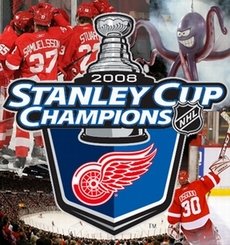I'm not a neo-con, in the sense my conversion to conservatism occurred on or about September 11, 2001. I converted a lot earlier than that, say around 1980 or so. My older reader will recognize that year as the watershed year in the chronology of modern American conservatism, the year Reagan was elected. And I voted for the man...not as a "Reagan Democrat," but as one who was completely and totally fed-up with the Left's angry rhetoric of discontent. Reagan's absolute faith in America and his contagious optimism appealed to me, especially when contrasted with the Perpetually Offended culture of the Left. It didn't help the Democrats' cause at all when Jimmy Carter told me that I, and all other Americans, suffered from malaise. Bullshit. One political conversion coming up. That's the Reader's Digest version. There are other reasons, too. But for brevity's sake, plus the fact I know you really don't give a flying fig, I'll spare you an extensive discussion.
So. I converted and never looked back. There's another reason I think these two essays are worthwhile. Ever since the 2000 election I've been amazed and disappointed in the increasingly hysterical opposition to President Bush. The corollary to that amazement is my attempt to understand it, i.e., how can supposedly rational, intelligent Americans be so very wrong when it comes to politics, and specifically, to foreign policy? The facile answer is Bush Derangement Syndrome, but I believe there's more to it than that. There has to be. I cannot, will not, accept as fact that 48% of Americans are mentally ill. So, I've been trying to understand modern American Progressive, or Liberal, or Left...call it what you will...politics. Enter these two essays from the Claremont Institute.
In The Crisis of American National Identity, Charles R. Kesler discusses two books (Who Are We? The Challenges to America's National Identity and American Politics: The Promise of Disharmony) by Samuel P. Huntington and the books' implications on American identity. Mr. Huntington is, in Charles Kesler's words, "a University Professor at Harvard (the school's highest academic honor), he has written a dozen or so books including several that are rightly regarded as classics of modern social science. He is a scholar of political culture, especially of the interplay between ideas and institutions; but in this book he calls himself not only a scholar but a patriot (without any ironic quotation marks). That alone marks him as an extraordinary figure in today's academy."
The essay's opening paragraphs:
About a decade ago, when he was vice president, Al Gore explained that our national motto, e pluribus unum, means "from one, many." This was a sad day for knowledge of Latin among our political elite—and after all those expensive private schools that Gore had been packed off to by his paterfamilias. It was the kind of flagrant mistranslation that, had it been committed by a Republican, say George W. Bush or Dan Quayle, would have been a gaffe heard round the world. But the media didn't play up the slip, perhaps because they had seen Gore's Harvard grades and figured he'd suffered enough, perhaps because they admired the remark's impudence. Though literally a mistake, politically the comment expressed and honored the multicultural imperative, then so prominent in the minds of American liberals: "from one," or to exaggerate slightly, "instead of one culture, many." As such it was a rather candid example of the literary method known as deconstruction: torture a text until it confesses the exact opposite of what it says in plain English or, in this case, Latin.and later:
After 9/11, we haven't heard much from multiculturalism. In wartime, politics tends to assert its sway over culture. In its most elementary sense, politics implies friends and enemies, us and them. The attackers on 9/11 were not interested in our internal diversity. They didn't murder the innocents in the Twin Towers or the Pentagon or on board the airplanes because they were black, white, Asian-American, or Mexican-American, but because they were American. (Although I bet that for every Jew they expected to kill, the terrorists felt an extra thrill of murderous anticipation.)
Multiculturalism likes to assert that all cultures are created equal, and that America and the West have sinned a great sin by establishing white, Anglo-Saxon, Christian, heterosexual, patriarchal, capitalist—what's next, hurricane-summoning?—culture as predominant. The problem with this argument is that it is self-contradictory. For if all cultures are created equal, and if none is superior to any other, why not prefer one's own? Thus Huntington's preference for Anglo-Protestantism—he never establishes it as more than a patriot's preference, though as a scholar he tries to show what happens if we neglect it—is to that extent perfectly consistent with the claims of the multiculturalists, the only difference being that he likes the dominant culture, indeed, wants to strengthen it, and they don't.There's much more here than a critique of multiculturalism. Mr. Kesler discusses the interplay between culture and the concept of "creed," and the historical origins of these concepts as applied to America. You could look upon this essay as an intellectual explanation of the "Culture Wars." It gave me some insight as to how the political mind of the Left works.
Of course, despite their protestations, multiculturalists do not actually believe that all cultures are equally valid. With a clear conscience, they condemn and reject anti-multiculturalism, not to mention cultures that treat women, homosexuals, and the environment in ways that Western liberals cannot abide. Unless, perchance, such treatment is handed out by groups hostile to America; for Robert's Rules of Multicultural Order allow peremptory objections against, say, the Catholic Church, that are denied against such as the Taliban. Scratch a multiculturalist, then, and you find a liberal willing to condemn all the usual cultural suspects.
Next up is Rebels Without a Clue, wherein William Voegeli reviews Nation of Rebels: Why Counterculture Became Consumer Culture, by Joseph Heath and Andrew Potter. The opening grafs:
Joseph Heath and Andrew Potter, the Canadian professors of philosophy who wrote Nation of Rebels, are men of the Left. "The reason we're leftists," Heath told the Nation of Rebels, "is that we actually share the core left-wing critique of capitalism…. [When] it comes to the environment, the stability of the banking system and the importance of macro-economic stabilization, labor-market policies, welfare, unemployment, health insurance—the Left has been absolutely right on every single issue."Voegeli closes with:
Their sensibilities, however, are conservative. Nation of Rebels can sound Burkean: "[The] only way we are able to go about our business in society is by trusting other people…. One way in which people establish the requisite trust is by demonstrating their willingness to play by the rules in small symbolic ways. This is the core function of courtesy and good manners." At one point Heath and Potter say to their allies on the Left, "[We] really need to stop worrying so much about fascism. What our society needs is more rules, not fewer." Elsewhere they contend that for adolescents the sexual revolution "was not liberation, it was hell. The absence of settled rules meant that no one knew what to expect from anyone else."
The 2004 election results triggered dismay and incredulity across the Left. Liberals have begun saying, "We've got to get serious." A 2004 article in the radical journal LiP, for instance, echoed the Nation of Rebels thesis: the Left has been undone by its own "activistism," an ideology combining "moral zeal" with "political illiteracy." The antiwar movement, for example, understands "success" to mean that "actions take place, conferences are planned, new people become activists," even though "it's no longer clear what war we're protesting." Details, details. "[It] turned out to be important to have something to say to skeptics who asked: 'What's your alternative?'"And there's lots of good stuff in between. All in the service of understanding, ya know.
Is an ameliorative Left possible? Heath and Potter are participants in an interesting experiment. If liberals' self-marginalizing narcissism is an accidental quality, one that can be cut away to leave behind a stronger determination to enact a better reform agenda, their efforts might succeed. If it's an essential attribute that can't be removed without killing the patient, then the task is hopeless.
For conservatives, the easy part is to agree with the book's devastating critique of countercultural inanities. The hard part is to know what to think of its authors' political project. A serious Left could be: a welcome change from the gassy self-righteousness of the transformative Left; a newly formidable adversary; or people one can do business with, to borrow Margaret Thatcher's remark about Mikhail Gorbachev. Of course, a serious Left may turn out, instead, to be simply impossible—a contradiction in terms.




.jpg)




No comments:
Post a Comment
Just be polite... that's all I ask.